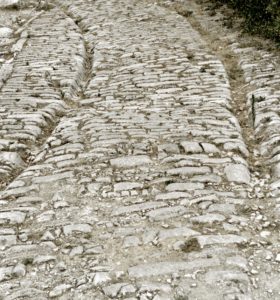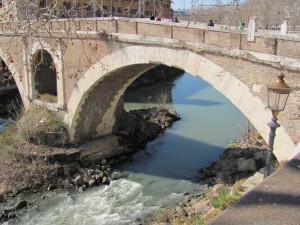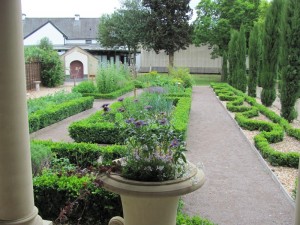Yes, this is a Roman road. And yes, it does eventually lead to Rome, the centre of the world at that time. It was part of a superhighway network that replaced mud tracks with paved, drained and fast roads which not only facilitated conquest but also economic expansion through the Roman world. Imperial couriers raced along the roads out of Rome, commandeering changes of horses from different cities and provinces, with orders from the centre of power reaching governors and commanders hundreds of miles away within days.
One of the most evident expressions of Roman power was through infrastructure – roads, bridges, aqueducts, theatres – and town planning – forums, temples, markets, grid systems, water supplies and baths.
Wherever Rome went, so did all the paraphernalia of Roman urban life. Villas were built, mosaics laid, walls painted, fountains set playing. Farmland was cultivated, trees felled, minerals extracted. Rome was nothing if not efficient and consuming. At one stage, its mineral extraction and industrial activity was so intense the pollution shows up today on geological ice bore samples.
So how did they do it? We know of military conquest; for the British Isles, we know Caesar boasted ‘Veni, vidi, vici’ although it was actually under Claudius that serious conquest began. Feature films have graphically, if not always accurately, given us the idea of an effective, disciplined, state-financed military organisation advancing through Europe, Asia and North Africa. But what happened afterwards?
Seduction.
Rome offered inclusion and prosperity, ruling through local power holders by making them part of the Roman success story. These leaders were granted Roman citizenship which gave them civic rights, their children were educated in the Roman way, albeit sometimes as semi-hostages, and resplendent villas were built for them; they sometimes received significant gifts of money. Their men of fighting age were drafted into the Roman army with the possibility of also attaining citizenship with land grants at the end of their service.
With such enticements, local leaders bought into the Roman style of gracious living, the ideas of the rule of law, culture and literacy and the considerable increase in trade and prosperity. Of course, the iron fist of Roman military might was ready to retaliate in the event of rebellion, which it did.
People travelled, emigrated and worked throughout the Roman administered world using one system and one currency. Personal evidence like pottery, jewellery, coins, messages and graves as well as skeletons show that people of all races and backgrounds, whether free or slave, highborn or plebeian, male or female, circulated within this world.
Rome last over 1200 years, but didn’t break out from village status until after fierce local wars in Italy, sacking by Celts and near annihilation by Hannibal. But once out of the Italian Peninsula, they evolved a colonial system that pushed the Roman ‘brand’ throughout most of Western Europe. Love it or loath it, Rome brought complexity, literacy and an approach to life that still resonates in Western life today.
Alison Morton is the author of Roma Nova thrillers – INCEPTIO, PERFIDITAS, SUCCESSIO, AURELIA, INSURRECTIO and RETALIO. CARINA, a novella, and ROMA NOVA EXTRA, a collection of short stories, are now available. Audiobooks are available for four of the series. NEXUS, an Aurelia Mitela novella, is now out.
Download ‘Welcome to Roma Nova’, a FREE eBook, as a thank you gift when you sign up to Alison’s monthly email newsletter. You’ll also be first to know about Roma Nova news and book progress before everybody else, and take part in giveaways.
















Just finished watching Mary Beard on a fantastic Roman site in Spain which I’ve never heard of. (Forgotten what it’s called!) So it was nice to finish up the evening reading your piece, Alison. Very interesting, as usual.
Thanks, Fenella. Yes, it’s an endless fascination…
Very true. Rome was influential in countless ways. I studied Latin at school for all of 9 years and am aware how much I still don’t know.
Every time you think you’ve got a grasp on Ancient Rome, something is discovered that changes our knowledge and understanding. Yet the the core values and heritage persist.